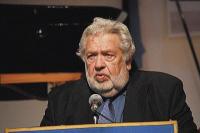
A simple answer does not reflect a complicated situation. However, many observers have noted the apparent reticence of Russian speakers when asked for their opinion.
Some observers have commented that prior to the Ukrainian crisis, which has received practically universal condemnation in the west, Russian speakers were ready and willing to offer their candid thoughts on all topics irrespective of their controversial or emotionally-charged nature.
Specifically Russian speaking youth at Kohtla-Järve were interviewed this past spring after they had completed school curriculum courses in national defence – something new in the educational program. It was expected that these courses would boost their sense of Estonian patriotism in comparison to the level it was before the courses.
In general the students were reticent about answering these questions saying they wanted to avoid anything political. When asked their opinions on the situation in Ukraine, the class room was dead silent. Discussion of the Ukrainian crisis, at least at that school, was a taboo topic. Even when the faculty were approached, specifically those instructors involved in the national defence courses, the interviewer did not get any discussion. It was impossible to discern how patriotic Russian speaking students and instructors answered when asked directly.
A campaign to raise food stuff and general aid for Ukraine ended in disappointment. Estonians were cynical about the soliciting stating that corruption was likely involved. Residents with Ukrainian roots were enthusiastically supportive of the effort. But Russian speakers? Again they didn’t want any involvement. They didn’t criticize Ukraine neither did they praise Putin. The topic once again was taboo. (These observations were from north-east Estonia, with a heavy Russian speaking population.)
Perhaps avoidance in commenting on Russia’s aggression stems from historical loyalties? Perhaps it’s unwillingness to reveal one’s opinion knowing full well the opinion of the Estonian-speaking interviewer? It might fear of recrimination, like in Russia, where most dissent has been repressed? Whatever the motivation was it was compelling enough to trigger such response.
Dr. Sirje Keen as recently noted Russian intellectuals making their observations public without aligning themselves with Putin’s aggressive stance. She sees some Russian speaking journalists having a different take on loyalties of Russian speakers in Estonia. Sergei Metlev, in a July 23 article in Eesti Express wrote: “It’s tough being a Russian right now. Putin has deceived us all these years, claiming that he wants Russia to rise from its subservient position. It’s actually the Soviet Union he’s bringing back to life. This is an undignified deception that still has the approval of the people. The notion Russia and the West are ideological enemies is making a vigorous come-back that for over two decades was a non-issue. (Pikemalt Eesti Elu 12.sept. paberlehes)

























